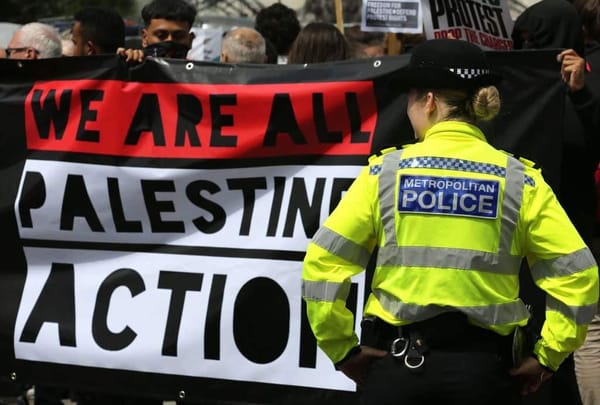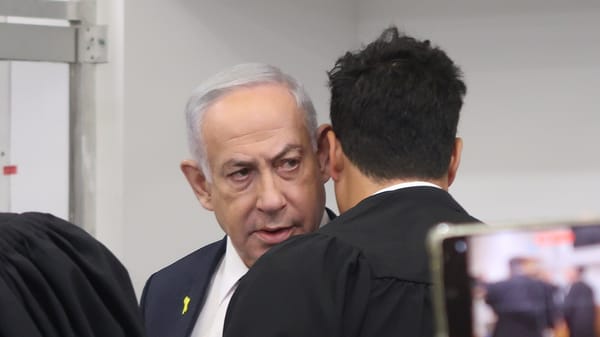Jewish leftists of the world, unite!
Fighting anti-semitism, real and weaponised.

In 2018, a German Jewish man called Dimitri Schulz formed the political group Jews in the AfD [the Alternative for Germany party]. “The AfD,” Schulz wrote, “is the only party in Germany that focuses on Muslims’ hatred for Jews, without playing it down.” And so the party does: in April 2018 a Syrian asylum seeker was found guilty of assault after attacking a man wearing a kippa in Berlin, AfD’s deputy chairman Georg Pazderski gave an unflinching analysis: “With the influx of Muslims, anti-semitism has again become admissible.” Weaponising anti-semitic attacks is exactly how the AfD – a far-right party whose leadership has been linked to banned neo-Nazi groups – has won over Jews like Schulz.
This unholy alliance between Jews and the far-right is nothing new. In fact, politicians across Europe and the US have enlisted in the war on anti-semitism for years now. In the UK, this manifested in the government of Boris Johnson – who called Muslim women “letterboxes” and Black people “piccaninnies”, and who sought to ship off asylum seekers to Rwanda – claiming to save the nation from the arch-anti-semite Jeremy Corbyn. In the US, it was Trump who, earlier this week, told liberal American Jews to “get their act together” and support Israel. Of course, overt anti-semitism is often read as philosemitism if communicated as support for Israel: in 2019, Politico reported that the Hungarian prime minister Victor Orban, an ally of former Israeli PM Benjamin Netanyahu, would fund an institute to fight anti-semitism while peddling antisemitic ideas about George Soros.
Diaspora Alliance has been established to resist this. A project of the movement accelerator Tides Advocacy, the group was founded in 2022 by leftwing Jewish activists in the USA, Germany and UK. Their ambition is to work collaboratively across these countries; earlier this year, they supported an international conference in Berlin on the right’s appropriation of Holocaust memory. With a team including IfNotNow co-founders Emma Saltzberg and Simone Zimmerman and German journalist Emily Discher-Becker, the group plans to challenge the weaponisation of anti-semitism by the far right.
Its first target? The Boycott, Divestment and Sanctions bill set to begin its journey through parliament any moment now.
I sat down with the group’s UK Director Emily Hilton to understand how the alliance came about, and its plans for the coming months.
Bella Saltiel: What is Diaspora Alliance?
Em Hilton: We’re a collective of scholars, activists, organisers and writers that have come together to address anti-semitism and combat its politicisation and instrumentalisation when it undermines progressive political projects.
We're currently operating in three countries: the US, Germany and the UK, with partners on the ground in Palestine and Israel. Currently, this is where we feel there's the most need for intervention.
BS: So, why now?
EH: In 2019, there was a convention of American and British Jewish leftists in London. We explored how anti-semitism was showing up in the public sphere and how it was being instrumentalised in each country. From that, some core relationships formed between people who are now involved in Diaspora Alliance.
In the UK, we've seen the proliferation of the IHRA definition of anti-semitism which is codifying the conflation of anti-semitism with anti-Zionism. We’ve seen the fallout from Corbyn's loss and the rise of [Boris] Johnson and Lizz Truss, both of whom are pushing a far-right agenda that is incredibly dangerous.
In the US, the issue of IHRA is less decided than it is in the UK so we are working to offer an alternative understanding that doesn’t pit antisemitism and Palestinian freedom against each other.
Trump’s comments last week about how American Jews should “get their act together” and support Israel also shows us how in real time antisemitic Zionism plus the growth in the political power of Christian Zionism is actually putting American Jews at risk, whilst pro-Israel advocates want to divert attention away from this to focus on progressive political figures who call our antisemitism and support Palestinian human rights, like Mehdi Hassan and Ilhan Omar. So the terrain is of course similar in every place we are operating but has some unique context in each place.
BS: What work does the alliance intend to do?
EH: We're an internationalist organisation. We see ourselves working with partners and allies to build solidarity and ensure that the challenges progressives have faced over the last few years – including Jewish people’s fears around anti-semitism – are addressed in a way that supports progressive power, rather than promoting divide-and-rule politics.
We’ve seen over history that when Jews feel threatened, we seek safety beside people in power. But a lot of those people, particularly on the right, are using us for their political agenda. Meanwhile, they have successfully divided us from our natural allies: other marginalised and minoritised communities. Anti-semitism is often the way in which they do that.
So an important part of our work is thinking about how anti-semitism operates, and how we build coalitions both to combat anti-semitism and to support others who are being attacked by the state. Generally, although not exclusively, the second part of that pertains to conversations around Palestine and Palestine solidarity.
BS: Can you give any specific examples?
EH: In the past few years, accusations of anti-semitism have very often been wielded by the right to undermine and shut down conversations around Palestine. The IHRA [The International Holocaust Remembrance Alliance’s definition of antisemitism, which has been accused of conflating criticism of Israel with anti-semitism] is one way of doing this; others include attacking the BDS [Boycott, Divestment and Sanctions] movement, or accusing Palestinian human rights activists of anti-semitism.
Some of our work will be about showing that Jewish safety and Palestinian liberation are not mutually exclusive, but actually aligned.
BS: Will the work of the alliance be focused on the Palestinian and Jewish diasporas, or will it extend to Israel and Palestine?
EH: We’re called Diaspora Alliance because there is a multitude of diasporas. We are here to build relationships, whether that’s the Palestinian diaspora or others. Our approach will be collaborative organising through ideas around building societies based on justice, and equality for everyone.
We’re also connected to partners on the ground in Palestine and Israel because that's the reality of the world that we live in: everything is connected. What’s happening in Germany impacts what's happening in the UK, which impacts what's happening in the US, which impacts what's happening in Israel and Palestine. We really believe ourselves to be an internationalist organisation because that's ultimately the best way to fight fascism.
BS: We’ve written about it in The Pickle previously, but for the uninitiated, tell us about what’s happening specifically in Germany.
EH: In Germany, with the legacies of Nazism and the Holocaust, there have been a lot of attempts within German society to address these issues through commemoration and the recognition of guilt. But one of the more concerning ways [that Germany has responded to its genocide] is through the idea that combating anti-semitism today requires unwavering, uncritical support for Israel. This happens on the political and societal level: for example, the Anti-Deutsche movement, a wing of the German left, sees the most anti-German thing you could do as supporting Israel because that's where Jews are. But that has problematic implications for Palestinian solidarity.
There are similar issues in the UK where particular Jewish organisations are seen as the official representatives of the Jewish community to the state – for example, the Board of Deputies.
These German equivalent organisations tend to have conservative views on things like migration. In the wake of 2015, after large numbers of refugees from places like Syria came to Germany, politicians stoked fear that this was going to lead to an increase in anti-semitism because a lot of these asylum seekers came from the Middle East. This is obviously not true – and particularly concerning given that anti-semitism in Germany comes from white supremacy, and given that this was happening at the same time that neo-fascists were reentering the German political sphere. They're now in parliament as the AfD.
AfD politicians will often say very inflammatory things about the Holocaust or engage in anti-semitic tropes. But in order to not be called out for this anti-semitism, they talk about their admiration for Israel. Their support for Israel acts as a shield for their deep-rooted white supremacy.
This is all happening at a moment when many leftwing Israelis have gone to live in Germany, – some call themselves “Israelis in exile” – and have become a target because of their criticism of Israel. Palestinians living in Germany are often accused of anti-semitism because they talk about Israeli apartheid or the Nakba – now this is also happening to Israeli Jews. That is a new frontier. We as an organisation are thinking about how to push back against these accusations, and make sure they don't shrink the space of political advocacy in Germany.
BS: Let’s go back to the UK. How have Boris Johnson and Liz Truss’s governments used anti-semitism to further a far-right agenda?
EH: Under Johnson and now Truss, the Tory party has lurched further rightwards by playing into people's fears of the Other. That’s particularly impacted people of colour, but it does have knock-on effects for white Jewish people too. The Tories’ philosemitism promises a fake safety that they put forward in part to further their pro-Israel agenda. They need a trade deal with Israel because Brexit has completely destroyed the UK economy. They also need a political partnership with Israel and use their supposed care for Jews to justify it.
Jews have been reduced to anti-semitism and Israel, and that is dangerous on two levels. The first is that it suggests that Jews don't need to care about other things like the cost of living crisis or the NHS or crackdowns on civil liberties or migration because we're above that, which feeds anti-semitic ideas of Jewish power. Second, the only thing that's associated with Jewish identity is then Israel or anti-semitism.
BS: Would you say that by conflating Jews with Israel it means that there’s a question about the place that Jews can take up within the nation-state?
EH: It makes it hard to say that Jews and Israel are not synonymous when someone from the Board of Deputies gets up at the Tory party conference and says that she's very excited that the government is going to move the embassy to Jerusalem. That makes us look like we are just basically agents of Israel. It puts us in this position of real deep danger.
BS: Would you say that there are parallels with the weaponisation of the Hindu diaspora in the UK?
EH: I think there are parallels between the rise of Hindutva and the rise of pro-Israel advocacy although I am not an expert. I think that nationalism is a really dangerous thing, and is one of the reasons why we as Diaspora Alliance are internationalist.
As the Black American historian Robin DG Kelley says, fascism relies on the nation. Internationalism is an antidote to that.
BS: Can you give us an idea of the plans the alliance has in motion?
EH: Some of the main things that I think people should be really aware of is what's happening in the public sphere. The BDS bill is going to try and prevent people from boycotting, divesting from or sanctioning foreign states, including those that commit human rights violations. That’s a really key example, in the next few months of how this issue of anti-semitism is being used to promote an anti-progressive agenda.
We are supporting Jewish groups and campaigners to take action to try and stop the BDS bill in its tracks, and ensure that the government is unable to use their faux concerns for Jewish safety as an excuse to clamp down on advocacy and campaigning for Palestinian human rights and liberation. I would also encourage Vashti readers to learn more about the Right To Boycott Campaign — which is a coalition of different organisations working together to stop this harmful legislation.▼





